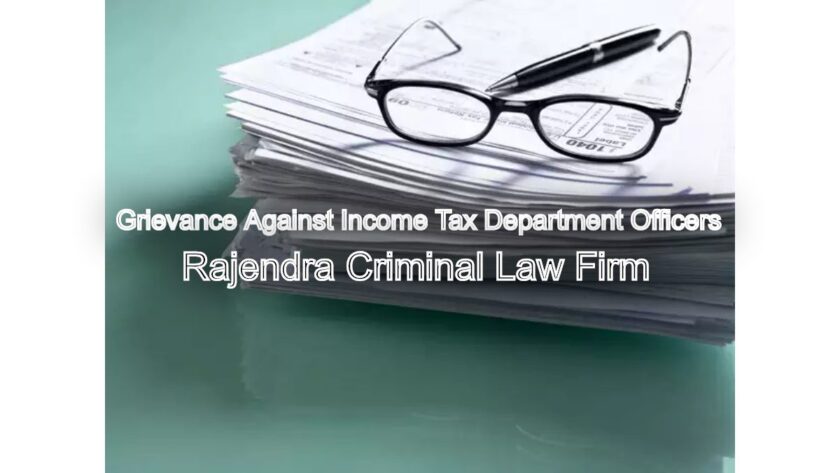How to Register a Grievance: Dealing with the Income Tax Department is a necessary part of life for most citizens. However, occasionally, taxpayers may encounter situations where they have legitimate grievances against income tax officers. These grievances can range from procedural irregularities and harassment to corruption and misconduct. Knowing how to effectively register a complaint and navigate the process is crucial. Rajendra Criminal Law Firm, with its expertise in legal matters, provides guidance on how to address such grievances and seek appropriate redressal.
How to Register a Grievance Against Income Tax Department Officers: Rajendra Criminal Law Firm
Understanding the Grounds for Grievance
Firstly, it’s important to understand the legitimate grounds for filing a grievance. Taxpayers can raise concerns about various issues, including undue delays in refunds, misbehavior by officers, demands for bribes, biased assessments, and misuse of authority. Furthermore, grievances can also stem from procedural lapses, such as incorrect application of tax laws, lack of transparency, or failure to provide proper explanations for actions taken. Consequently, documenting specific instances of misconduct or irregularity, along with supporting evidence, is essential for a successful complaint.
Internal Grievance Redressal Mechanisms within the Income Tax Department
Secondly, before escalating a complaint to external authorities, it’s advisable to explore the internal grievance redressal mechanisms within the Income Tax Department itself. Specifically, taxpayers can approach the Grievance Redressal Officer (GRO) at the jurisdictional level or the Chief Commissioner of Income Tax. Additionally, the department has a dedicated online portal, the Central Public Grievance Redress and Monitoring System (CPGRAMS), where taxpayers can register their complaints and track their status. Moreover, these internal channels often provide a faster and more efficient way to resolve issues, particularly those related to procedural errors or administrative delays.
Escalating the Complaint to Higher Authorities
However, if the internal mechanisms fail to provide a satisfactory resolution, taxpayers can escalate their complaint to higher authorities. For instance, they can approach the Income Tax Ombudsman, an independent body that investigates complaints related to income tax matters. Also, depending on the nature of the grievance, complaints can be filed with the Central Vigilance Commission (CVC), which deals with corruption and misconduct by government officials. Furthermore, in cases involving serious offenses, such as bribery or criminal intimidation, taxpayers can file a First Information Report (FIR) with the police.
The Role of Legal Counsel
Thirdly, navigating the complex process of registering a grievance and pursuing it through various channels can be challenging. This is where the expertise of legal counsel becomes invaluable. Specifically, a lawyer specializing in tax and criminal law can provide guidance on the appropriate course of action, assist in drafting a well-articulated complaint, and represent the taxpayer before relevant authorities. Additionally, they can help gather evidence, interpret tax laws and regulations, and ensure that the complaint is pursued effectively and within the legal framework.
Rajendra Criminal Law Firm: Expertise in Handling Grievances
Now, let’s discuss Rajendra Criminal Law Firm, which offers expert legal services in handling grievances against income tax officers. With a team of experienced lawyers specializing in both tax and criminal law, the firm provides comprehensive assistance to taxpayers facing such challenges. Specifically, they understand the intricacies of income tax laws, procedures, and regulations, as well as the mechanisms for filing complaints and pursuing legal remedies. Furthermore, they possess the skills and experience to investigate allegations of misconduct, gather evidence, and present a strong case before the appropriate authorities.
Assistance with Drafting and Filing Complaints
Moreover, Rajendra Criminal Law Firm assists clients in drafting and filing well-structured and legally sound complaints. For instance, they ensure that the complaint clearly articulates the nature of the grievance, provides specific details of the alleged misconduct, and includes all relevant supporting documents. Also, they advise clients on the appropriate forum for filing the complaint, whether it be the internal grievance redressal mechanism, the Income Tax Ombudsman, the CVC, or the police. Similarly, they help clients navigate the procedural requirements for filing complaints, ensuring compliance with all applicable rules and regulations.
Representation Before Authorities
Equally important, Rajendra Criminal Law Firm represents clients before various authorities, including income tax officials, the Income Tax Ombudsman, the CVC, and the police. Specifically, their lawyers appear on behalf of clients at hearings and investigations, presenting their case persuasively and advocating for their rights. Furthermore, they ensure that clients are treated fairly and that their grievances are addressed promptly and effectively. In addition, they provide legal representation in any subsequent legal proceedings that may arise from the complaint.
Gathering Evidence and Conducting Investigations
Additionally, Rajendra Criminal Law Firm assists clients in gathering evidence to support their grievances. For example, they can help obtain relevant documents, interview witnesses, and conduct investigations to uncover evidence of misconduct or irregularity. Also, they work closely with forensic experts and other professionals, if necessary, to build a strong case. Similarly, they ensure that all evidence is collected legally and ethically, adhering to the principles of due process.
Legal Advice and Guidance
Undeniably, Rajendra Criminal Law Firm provides sound legal advice and guidance throughout the grievance redressal process. They explain the relevant laws and regulations, advise clients on their rights and responsibilities, and help them understand the implications of different courses of action. Therefore, clients can make informed decisions and pursue their grievances with confidence. Furthermore, they keep clients updated on the progress of their case and provide clear and concise explanations of complex legal issues.
Frequently Asked Questions (FAQs) about Grievances Against Income Tax Officers
Valid grounds include undue delays in refunds, misbehavior, demands for bribes, biased assessments, misuse of authority, procedural lapses, incorrect application of tax laws, lack of transparency, or failure to provide explanations for actions. You must have specific instances and evidence.
You can approach the Grievance Redressal Officer (GRO) at the jurisdictional level, the Chief Commissioner of Income Tax, or use the online portal CPGRAMS (Central Public Grievance Redress and Monitoring System) to register complaints.
If internal channels are unsuccessful, you can escalate the complaint to the Income Tax Ombudsman, the Central Vigilance Commission (CVC) for corruption matters, or file an FIR with the police for serious offenses like bribery or criminal intimidation.
A lawyer can provide guidance on the correct course of action, assist in drafting a strong complaint with supporting evidence, represent you before authorities, and ensure your complaint is pursued effectively within the legal framework.
Rajendra Criminal Law Firm offers expert legal services, including assistance with drafting and filing complaints, representation before authorities, gathering evidence, conducting investigations, and providing legal advice throughout the grievance redressal process.
Conclusion
In conclusion, registering a grievance against income tax officers requires a thorough understanding of the process and the legal framework. Rajendra Criminal Law Firm, with its expertise in tax and criminal law, provides invaluable assistance to taxpayers facing such situations. From drafting and filing complaints to representing clients before various authorities, they offer comprehensive legal services. Therefore, if you have a legitimate grievance against an income tax officer, seeking the advice and representation of Rajendra Criminal Law Firm can significantly enhance your chances of achieving a just and fair resolution. Their expertise, combined with their commitment to client service, makes them a trusted partner in navigating the complexities of income tax law and grievance redressal.
Read More
- Sexual harassment: The police officer appeared before CB-CID
- How to Lodge a Complaint About Indian Railway Officers
- How to File a Complaint Against Central Government Officers: A Step-by-Step Guide
- CBI detained Chennai income Tax Officer & a Chartered Accountant in bribery case
- Demystifying Civil and Criminal Sanctions: Indian Income Tax Act Explained
- Central Public Grievance Redress and Monitoring System (CPGRAMS):





